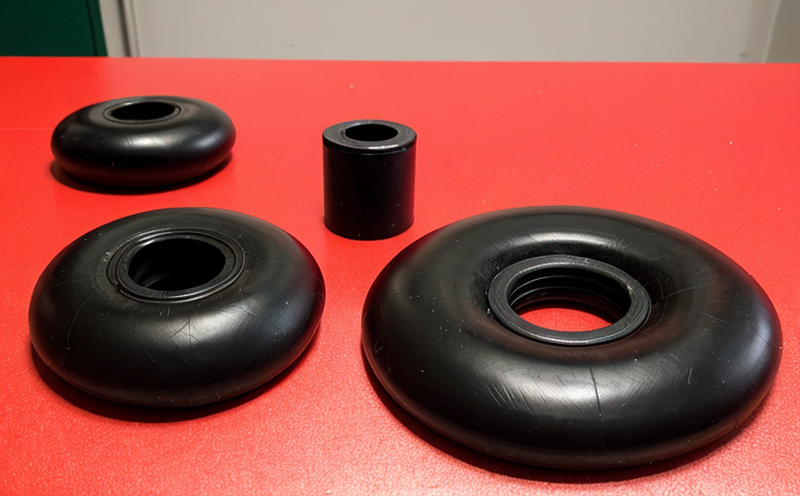SAE J30 Fuel Hose Rubber Testing
The SAE J30 fuel hose rubber testing is a critical service that ensures compliance with stringent industry standards and regulations for the design, manufacturing, and performance of fuel hoses used in automotive applications. This testing protocol is essential to guarantee safety, reliability, and durability under various operating conditions. The test encompasses a series of mechanical, chemical, and physical evaluations aimed at assessing the hose's resistance to fuel pressure, temperature, and environmental stress.
The SAE J30 standard covers a wide range of tests that evaluate the integrity, flexibility, and overall performance of rubber compounds used in fuel hoses. These tests are designed to simulate real-world conditions encountered by fuel hoses during their lifecycle, ensuring they meet or exceed safety standards set forth by regulatory bodies worldwide.
The testing process typically includes specimen preparation where samples are cut from production batches to ensure representativeness. The prepared specimens undergo a series of mechanical tests such as tensile strength, flexural endurance, and abrasion resistance. Additionally, chemical resistance tests are conducted using various fuels like gasoline, diesel, and kerosene to determine the hose's compatibility with different fuel types.
For temperature and environmental stress testing, specimens are subjected to high-pressure fuel flow at elevated temperatures. This test evaluates how well the rubber compound maintains its structural integrity under these conditions. The results of these tests provide critical data that helps manufacturers optimize their formulations and improve product quality.
The SAE J30 fuel hose rubber testing also includes visual inspections and dimensional checks to ensure the hoses meet specified tolerances. These assessments are crucial for maintaining consistency in production processes and ensuring that each piece adheres to precise specifications set by regulatory agencies.
By subjecting rubber compounds used in fuel hoses to rigorous SAE J30 standards, laboratories can provide assurance that products will perform reliably under diverse conditions, thereby protecting end-users from potential hazards associated with compromised fuel hose integrity. This comprehensive approach ensures compliance with international standards such as ISO 1522 and ASTM D4789.
| Test Parameter | Description |
|---|---|
| Tensile Strength | The maximum stress a material can withstand before breaking, measured in MPa or psi. |
| Flexural Endurance | The number of times a specimen can be flexed without failure. |
| Abrasion Resistance | Measure of how well a rubber compound resists wear and tear, typically measured in grams or milligrams. |
| Fuel Type | Description |
|---|---|
| Gasoline | A volatile petroleum product used primarily as a fuel for internal combustion engines. |
| Diesel | A heavier, oilier form of petroleum often used in diesel engines and heaters. |
| Kerosene | Primarily used as jet fuel but also serves various industrial purposes. |
Benefits
- Ensures compliance with SAE J30 standards and international regulations.
- Enhances product reliability and safety for automotive applications.
- Improves material selection through detailed testing data.
- Promotes consistency in production processes.
- Protects consumers from potential hazards associated with compromised fuel hose integrity.
Industry Applications
The SAE J30 fuel hose rubber testing is widely applicable across various automotive sectors, including passenger vehicles, commercial trucks, and off-road equipment. This testing ensures that the rubber compounds used in fuel hoses are robust enough to withstand the harsh operating conditions typical of these applications.
| Automotive Sector | Description |
|---|---|
| Passenger Vehicles | Includes cars, SUVs, and minivans designed for personal use. |
| Commercial Trucks | Covers heavy-duty trucks used in freight transportation. |
| Off-Road Equipment | Includes vehicles like jeeps, motorcycles, and construction equipment used in challenging terrains. |
The robustness of the rubber compounds tested under SAE J30 standards is vital for ensuring the longevity and safety of fuel hoses across these diverse applications. By adhering to this rigorous testing protocol, manufacturers can enhance their reputation and trustworthiness in the automotive industry.
Why Choose This Test
Selecting SAE J30 fuel hose rubber testing is advantageous for several reasons:
- Comprehensive Evaluation: The test evaluates multiple properties of the rubber compound, ensuring a holistic approach to product quality.
- Regulatory Compliance: Ensures compliance with international standards and regulations, reducing the risk of non-compliance penalties.
- Risk Mitigation: By identifying potential issues early in the development process, manufacturers can mitigate risks associated with compromised fuel hose integrity.
- Informed Decision-Making: Provides detailed testing data that aids in informed decision-making regarding material selection and production processes.
- Enhanced Reputation: Demonstrating adherence to stringent standards enhances a manufacturer's reputation, leading to increased market confidence.
The SAE J30 fuel hose rubber testing is not just a compliance requirement but also a strategic investment in product quality and customer satisfaction. By choosing this test, manufacturers can ensure that their products meet the highest safety and performance standards.





